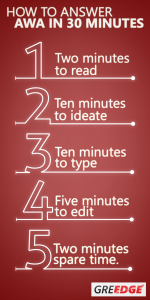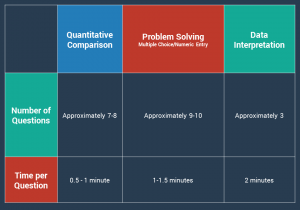Time Management Tips to Score a 320+ in GRE
The value of a great GRE score to your graduate school applications cannot be underestimated. A 320+ in your GRE is not only your ticket to some of the best schools out there, but in many cases also paves the path to full funding and scholarship opportunities.
So what is the secret to a good GRE score? How can you conquer the GRE and get admitted to your dream school?
The answer to those questions is deceptively simple – good time management skills. Master this, and you will master the GRE. However, of course, this is easier said than done.
Why do students usually have problems managing time?
- Lack of preparedness – Unsure of the concepts involved.
- Lack of clarity in prioritizing questions – Spending a long time on one question.
- Unfamiliar with the format of the test.
- Nervous about the timer.
Learning good time management skills is the first and the most important step you must take in your GRE journey. How can you do this? Rather than giving you some general tips, let me explain what you can do section-wise as you encounter them in GRE!
Section 1: Analytical Writing
Section 1: Analytical Writing
The first section in the GRE is always the analytical writing (or AWA) section. Now, a large number of GRE test takers make the grave mistake of skipping their AWA and using the allotted one hour to complete the other sections of the test, since the AWA does not directly affect the final GRE score. However, a good score in your AWA has the ability to boost your applications, so we highly recommend that you do not skip it. The AWA has two essay tasks, the Argument task and the Issue task, both of which are designed to test your critical thinking skills and your ability to develop, articulate, and defend an argument. Of course, it is no mean feat to write an excellent essay in just thirty minutes, but there are ways you can still nail it.
How can you score above 4 in AWA? Get your strategy, tips and the ultimate guide to scoring above 4 in AWA! Download your AWA eBook now!
- Take a minute or two to actually plan how you are going to go about writing your essays. This may seem like the very opposite of time management, but you will be surprised to know how many aspirants start their essays without a clear outline and then end up writing vague and irrelevant things.
- Write the introduction in the last. Many students waste much time trying to write that perfect introduction. Once you have the body of your essay ready, writing your introduction will be much easier.
- Keep it sweet and simple. Don’t try to use words and phrases you aren’t familiar or comfortable with. Simplicity is key. Write sentences that are succinct yet impactful. Be natural, be you.
- Don’t overlook the importance of proofreading. When you are writing in a hurry, you may make some grammar or spelling errors. Give yourself a few minutes to proofread and edit.
- Make your conclusion powerful by introducing the opposing viewpoint and then refuting it in a couple of sentences. This shows that you acknowledge the other side of the argument, but your argument is the right one.
- Most importantly, practice, practice, and practice. Take many GRE mock test as possible to acquaint yourself with the time constraints, and then get them evaluated by a teacher or a GRE instructor.
Section 2: Quantitative Reasoning
Section 2: Quantitative Reasoning
The quantitative reasoning section of the test has two sub-sections of twenty questions each. The time allotted is 35 minutes for each section, which roughly means 1.75 minutes for each question. However, some questions could be completed in 30 seconds or less, while others, especially the Discrete Quant and Data Interpretation questions, will require some more work.
Target Time for Quant:
Target an average of 1.5 minutes per question. You can also try allocating time depending on the question type.
For example,
Aiming for a 170/170 in GRE Quant? You only have to apply 5 techniques to reach that score! Wondering what these techniques are? They’re all compiled in one eBook by our experts! Download your GRE Quant eBook now!
Expert Tips for Quantitative Reasoning:
- A thorough mastery of relevant formulae and equations will make things considerably easy for you. Make sure you have these at your fingertips – it will prove extremely useful when you are in a time crunch.
- Be quick, but be precise. Don’t make the mistake of simply skimming over the easy questions without verifying the answer. It is important to balance speed with correctness.
- Don’t linger on one question, if you find it difficult. Remember that in the GRE, all the questions carry equal marks. You can always flag the question and go back to it later if you have the time.
- It is okay to let go of a couple of questions, but be sure you attempt the questions you do know the answer to, so if push comes to shove, you can skip the ones you had difficulty with.
- If you are hesitant about leaving questions unanswered, then simply guess the answers. Wrong answers do not carry negative marks, so even if your guess is wrong, you will at least not be penalized for it.
- Read the question properly to understand what is being asked. Some questions may look simple at first glance, but that may not be the case at all. For instance, you could be asked for the “value of the smallest prime factor of y” rather than just the “value of y.” If you cannot come up with a way to solve the question within the first 20 seconds, mark the question and move on!
- Put your scratch pad to the best possible use. Rough calculations, tricky formulae, or a complex geometrical figure – whatever it is, writing or drawing it will help you de-clutter your mind.
Section 3: Verbal Reasoning
Section 3: Verbal Reasoning
Similar to the quantitative reasoning section, the Verbal section also consists of two sections of twenty questions each. However, the time allotted is 30 minutes for each section, which leaves you with about 1.5 minutes for each question. Of these forty questions, two will be Reading Comprehensions (or RCs), one short and one long, which will require more time than the other questions, so economize your time judiciously.
Target time for Verbal:
Expert Tips for Verbal Reasoning:
- For GRE verbal practice, try to read the newspaper every day. Circle the words or phrases you are unfamiliar with, and look them up later. This is the easiest and best way to improve your vocabulary.
- Tackle the sentence equivalence and text completions first so you can focus on the RCs peacefully.
- Make notes and pointers while reading the RCs. Make note of any names, words or dates that catch your eye. Use the analytical reading technique to master RC.
- Again, since all questions on the GRE carry the same marks, don’t spend too much of time agonizing over one question. Simply flag it and move on to the next question.
- It goes without saying that a good command over GRE vocabulary and grammar rules is indispensable to a great Verbal score, so work on these every day while preparing for the exam.
- When in a serious time crunch, guessing is your best option. Try not to leave any question unanswered, but it is okay if you do.
Confused about your GRE Verbal? Get the ultimate guide to cracking GRE Verbal Download your FREE eBook now!
To conclude, time management and rigorous practice are the building blocks of a good GRE score. If you follow these tips and practice every day without fail, there is nothing that can hold you back from a 320+ on your GRE.
For more information and complete guidance for your GRE preparation, download the complete guide to GRE preparations.














I have noticed you don’t monetize your blog, don’t waste your traffic,
you can earn additional cash every month because you’ve got hi quality content.
If you want to know how to make extra money, search for: Mertiso’s tips best adsense
alternative
Hi, is anybody here interested in online job? It is simple survey filling.
Even $10 per survey (ten minutes of work). If you are interested, send me email to hans.orloski[at]gmail.com